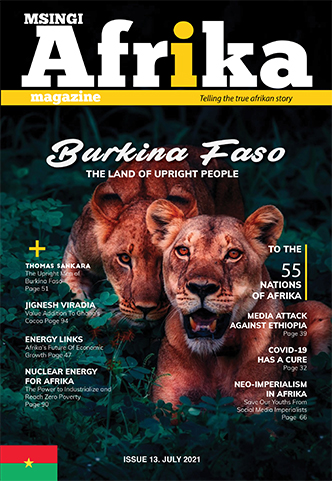When Google Dies

Chioma Phillips is the Editor of Msingi Afrika Magazine and…
The month was December, in the year 2020AD; the year that was. Millions of Google users around the world were suddenly unable to access services such as Gmail, Google Docs, YouTube, Google Drive – in all about a dozen Google services. For a disconcerting 45 minutes tons of documents, information, passwords, images, videos that had been ‘safely’ preserved on the cloud somewhere, services so interwoven into people’s lives that they couldn’t have imagined having to do without them were utterly and completely cut off. In a Tweet, Google attributed the “authentication system outage” to “an internal storage quota issue”. According to an article on bbc.com, the outage had a “knock-on effect on other apps, with players of the smartphone game Pokémon Go, for example, reporting being unable to log in.”
As the BBC said in their article on the outage, “The Google crisis may have been brief… but it was an unnerving reminder of just how dependent millions of people have become on services in the cloud.” As a Twitter user said, “I’m sitting here in the dark in my toddler’s room because the light is controlled by @Google Home. Rethinking… a lot right now.” Yes, one does need to rethink. In a world where billions of people have submitted their content to a remote location accessible to them only through a device and an internet connection, just how much control have people given away? Monday 14th December gave the world a demonstration for ¾ of an hour. Shock, surprise, bemusement, fear and even frustration were some of the immediate reactions by users, but the long term response needs to go deeper than that.
You see, I believe that those 45 minutes were a gift to the world of private and corporate users of cloud services in general. You must remember that Google’s “mission is to organize the world’s information and make it universally accessible and useful.” For decades I have watched as they did just that, not only by signing on millions of individual and business users to their every growing base of services but by gathering and managing the information shared by billions of people across the world to make it searchable, analyzable and monetizeable by themselves and any other willing takers. Information.The most valuable resource of our day. It can tell you who people are, where they are, where they spend their time and money, how they think, whether they are responding to news stories and other external influences and in what ways they are doing so. It can tell you who their friends are, who is in their inner circles and who is not. Except for those who have learnt how to carefully navigate this realm, it can be used to anticipate future choices and behavior in unsettling ways and be used to manipulate and influence decision making quite effectively.
Consider this: Just like every other thing that you do online, every response to the 45-minute downtime is being recorded, tallied and analyzed and added to a massive database on human behavior in this worrisome digital age that the world has embraced so blindly; including the contents of this article. According to Quora, 2006 figures show that “the Google search crawler handles 850 TB of data raw from the web, while Google Analytics uses 220. Google Earth uses 70.5 TB for both its map imagery and index data…” The author says that this is closely guarded information. One can only imagine what the behemoth has managed to do in the 14 years since. And that’s just Google. Every online service that one gives their data to, paid or free, secure or not, does its own storage and analytics for its own purposes and you have to know how easy it is for an administrator in Google, Facebook, Twitter, WeChat, Whatsapp, Telegram, LinkedIn, YouTube, TikTok, you name it… to flip a switch and disable your account, and instantly cut off your access to Giga or Terabytes of your most valuable data and connections to whatever you have integrated your accounts with. Including job sites, government portals, education platforms and on and on and on.
The truth is, your control is governed by the myriad clauses and convoluted statements in those annoying Terms and Conditions and policies that you click assent to without paying much attention to. Which get updated periodically based on changing trends, legal issues or specific agendas that are facing the tech world or that the tech world is trying to force on you daily. You are not in control. And in 2700 agonizing seconds, over 7 billion people were given a much-needed reminder of this through Google’s temporary demise.
Ever think what would happen if this became permanent? If suddenly Google and other services like it vanished from cyberspace taking all your valuable data with them. Are you prepared for such a situation? Or what if, like has been foretold, the entire internet is switched off for one hour and then switched back on and the requirement for you to access your accounts again is to do something that you ordinarily wouldn’t do? What if all your linked government networks were shut down suddenly and then restarted with new conditions required of you to access them, like signing over your land, or force vaccinating your child? What if these internet services are switched off and switched on again carrying within them some hidden bots and code that are detrimental to you? Gathering even more data on your life than they previously did – and there is nothing you can do about it? Like the man who sat in the dark in his toddler’s room, rethinking many things, are you willing to contemplate such a possibility and its effects on your life and your family? Do you like what you see?
This world is classically notorious for over-complicating the simplest things in life such as spending huge sums of money to develop harmful GMO crops to withstand deadly poisonous chemicals – instead of finding natural ways to help insects get their nutrition elsewhere and protect food crops using means that do not cause chronic illnesses like cancer. Like spending huge amounts of money creating golden rice in a lab so as to introduce carotenes into a diet, instead of just planting pumpkin and carrots. This disastrous trend in poor thinking – even while heavily papered with multiple university degrees – causes the world to tend towards activities and behaviors that are more detrimental than they are a blessing or healing. And Afrikans and their governments have blindly danced to the tune of the world’s self-deception, foolishly embracing trends and technologies that are now killing her.
Convenience, speed, efficiency, cost-effectiveness and profit are the altars at which the world has sacrificed its freedom and while people move about with an illusion that they have liberty, in truth the world around them is closing in to cut off every possible angle of free will and choice that it can. Between big tech censorship, big media censorship and the propaganda that the two entities support in either government or private sector sponsored moves or both – you’re running out of space to live in, but you may not be aware of it yet. That’s why December 14th 2020 was such an important day. It came as a slap in the face to wake the world up out of its crazy tech-infused stupor and bring it back to its senses; kind of like suddenly waking up and realizing that your house is on fire and you have but moments to escape.
What's Your Reaction?
Chioma Phillips is the Editor of Msingi Afrika Magazine and the host of Msingi Afrika Television. Her hope is to see the Truth shared, with all who will listen, for the transformation of the people and the continent of Afrika - and the world. She believes passionately in the critical role that Afrika and Afrikans have to play on earth right now and hopes to ignite the spark that will cause them to see and believe who they are, so that they can live out their Truest lives for the remainder of their days.


















